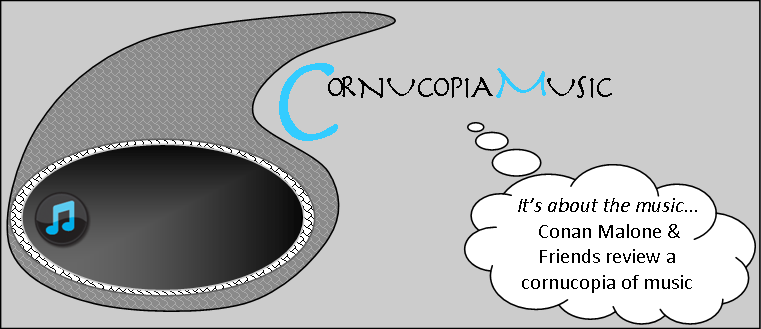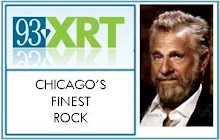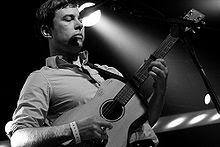My first introduction to Rufus Wainwright and this week's album of the week, Want Two, was a CD loan from a colleague in Boulder, CO back in 2005. Soon thereafter I found myself home from work, sick but as much sick with dis ease of life, and my old five changer was loaded with Rufus, Ray Lamontagne and some mellow mixes I had made over the years.
Rufus is the son of folk singers Louden Wainwright III and Kate McGarrigle who by coincidence died today 1/20/2010 of cancer. The first song on this album reflects Rufus' study of opera and undoubtedly will ease his mother's transition into the beyond. I'm putting this song on my own funeral mix. This haunting song (Agnus Dei) sets the tone for an album that is both otherworldly and very much of this human existence. Rufus' unique voice floats in and out your perception, the lyrics sometimes pulling you into the song, the music sometimes lulling you into journey within.
If ever you need a mellow, but dynamic musical accompaniment for a day of respite, sanctuary or a drive through a gray winter day, try Want Two and see if it doesn't get a little better.
From Wikipedia:
Early life (1973–1994)
Wainwright was born in Rhinebeck, New York, to folk singers Kate McGarrigle and Loudon Wainwright III.[2][3]. His parents divorced when he was three years old, and he lived with his mother in Montreal, Canada for most of his youth. Wainwright is both a U.S and Canadian citizen.[4] He attended high school at the Millbrook School in upstate New York (which would later inspire his song "Millbrook"), and later briefly studied piano at Concordia and McGill Universities in Montréal. He began playing the piano at age six, and started touring at thirteen with "The McGarrigle Sisters and Family", a folk group featuring Rufus, his sister Martha, his mother Kate, and aunt Anna. His song "I'm a-Runnin'", which he performed in the film Tommy Tricker and the Stamp Traveller at the age of fourteen, earned him a nomination for a 1989 Genie Award for Best Original Song.[5] He was nominated for a 1990 Juno Award for Most Promising Male Vocalist of the Year.[6]
Wainwright came out as gay while a teenager.[7] In 1999, he told Rolling Stone that his father recognized his homosexuality early on. "We'd drive around in the car, he'd play 'Heart of Glass' and I'd sort of mouth the words, pretend to be Blondie. Just a sign of many other things to come as well."[8] Wainwright later said in another interview that his "mother and father could not even handle me being gay. We never talked about it really."[9]
Wainwright became interested in opera during his adolescent years, and the genre strongly influences his music. (For instance, the song "Barcelona" features lyrics from the libretto of Giuseppe Verdi's opera, Macbeth.) During this time, he became interested in Édith Piaf, Al Jolson, and Judy Garland.
Rise to fame, debut album (1995–1999)
Through weekly shows at Cafe Sarajevo, Wainwright was on the Montréal club circuit and eventually cut a series of demo tapes produced by Pierre Marchand, who produced Wainwright's album Poses. The resulting tapes impressed his father Loudon, who passed them on to his friend Van Dyke Parks. Parks sent the recordings to Lenny Waronker, the DreamWorks executive who eventually signed Wainwright to his label.[12] Waronker stated the following of Wainwright: "When I was about to listen to his tape, I remember clearly I was thinking, 'Gee, if he has the mom's musicality and smarts, and the dad's smarts and voice, that'd be nice.' Then I put it on and I said, 'Oh, my God, this is stunning.'"[12]
The singer moved to New York City in 1996, performing regularly at Club Fez. He relocated to Los Angeles that year and began his first studio album, 1998's Rufus Wainwright. Waronker paired Wainwright with producer Jon Brion, and the two spent most of 1996 and 1997 making the record. Wainwright recorded 56 songs in total, on 62 rolls of tape. The sessions cost $700,000.[12]
Wainwright's self-titled debut received critical acclaim; Rolling Stone recognized it as one of the best albums of the year, and named the singer "Best New Artist" of the year. Wainwright was nominated for four awards by the Gay & Lesbian American Music Awards, including Album of the Year, Pop Recording of the Year and Video of the Year, and won for Best New Artist.[13][14] Rufus Wainwright won a GLAAD Media Award for Outstanding Music Album and a Juno Award for Best Alternative Album.[15][6] However, commercial success of the album was limited; the debut failed to chart in any country, though he ranked #24 on Billboard's Top Heatseekers chart.[16]
Wainwright toured with Sean Lennon in 1998 and began his first headline tour later that year. In December 1998, he appeared in a Gap commercial directed by Phil Harder, performing Frank Loesser's "What Are You Doing New Year's Eve?". In March 1999, Wainwright began a headlining tour at Maxwell's in Hoboken, New Jersey.











